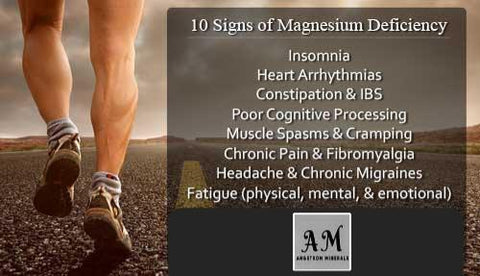Magnesium & Your Health
Posted by Shameka Simons on
The Many Responsibilities of Magnesium
Magnesium is one of seven essential minerals that the body needs in significant amounts to function and maintain good health. Those minerals are, calcium, chloride, magnesium, phosphorus, potassium, sodium, and sulfur. While most people understand the value of some vitamins and other supplements, magnesium is often overlooked by consumers as an important nutrient. It does deserve consideration and attention, as magnesium deficiency can cause real health problems.
Magnesium helps to regulate and facilitate many essential bodily functions. “Perhaps its most important job is to enable healthy enzyme function,” says internal medicine specialist, Dana Habash-Bseiso, MD. Magnesium is involved in more than 300 different enzyme activities that help to regulate biochemical reactions in our body, those that involve magnesium, include protein synthesis, calcium absorption, and muscle and nerve function. The mineral also contributes to blood glucose and blood pressure control, and the formation and maintenance of bones and teeth. It is important to incorporate magnesium into the daily diet to promote good health.
Combats Depression
The levels of magnesium in our body can also influence mood changes and brain functions. Studies have shown that low levels of the mineral may increase the risk of depression. Low magnesium intakes may present other great risks. Some experts have suggested that the low magnesium content of foods today may be the cause of depression and other mental illnesses. This is not accepted as fact yet and will take more research to provide supporting evidence. If the magnesium in food is not enough, supplements are a great option. In fact, taking supplements, according to studies, have shown dramatic results in improving blood pressure. Magnesium can also have an impact on improving mood as effectively as an anti-depressant drug.
Promotes calcium absorption
It is possible to maintain bone health and to prevent the occurrence of osteoporosis if the necessary precautions are taken. What you need are the cooperative efforts of both calcium and magnesium. The absence or deficiency of magnesium, coupled with a high intake of calcium can lead to many health problems. These include cardiovascular disease, arterial calcification, and the formation of kidney stones. Always take magnesium when you have calcium supplements as the former will ensure the metabolism of the latter. You can find the magnesium supplement in combination with calcium supplements as well.

Helps alleviate constipation
Magnesium can also provide fast relief from constipation. If you are experiencing a severe case of constipation, take a dose of water-soluble supplements of magnesium. When ingested, magnesium has laxative properties, which will relax the muscles of the intestine and allow for a healthy bowel movement. This will create an easier rhythm while being able to pass bowels normally. Magnesium's water-absorbing property can soften the stool, making it easier to pass.
May prevent eclamptic seizures
Women who are planning to have a child should consider magnesium. It is a vital mineral for the body during pregnancy because of several reasons. First, magnesium reduces the risk of osteoporosis by increasing bone density and calcium absorption. Second, the element increases the pain tolerance level during delivery by relaxing blood vessels. Third, in the form of Magnesium sulfate, it is used as a treatment for preventing eclamptic seizures. Such is common in expectant mothers who have high blood pressure.

Anti-inflammatory benefits
Chronic inflammation is usually linked to low levels of magnesium. Such can lead to chronic diseases, premature aging, and obesity. Studies have shown that children with low magnesium levels have the highest levels of the inflammatory marker, C-Reactive Protein (CRP). The children also had higher triglyceride, blood sugar, and insulin levels. Studies suggest that it is possible to lower the CRP and other inflammatory markers in adults by taking magnesium supplements. The same thing goes for those who are pre-diabetics, obese, and overweight. If you prefer not to take a magnesium supplement, consider eating foods such as dark chocolate and fatty fish, both being good sources of the mineral.
Helps control diabetes
Magnesium also influences blood sugar. It helps in regulating insulin reactions to blood sugar levels. This is particularly important for diabetic patients. It is not uncommon for these patients to suffer from magnesium deficiency. The regulation of blood sugar will promote normal blood pressure. It's a fact that hypertension is usually a precursor of a heart attack. Fortunately, if you can control your blood pressure, you can also reduce the risks of an attack. It seems to be that people who are hypertensive are almost always magnesium-deficient. They should, therefore, consider taking magnesium supplements. Also, consider consuming nutrients rich in magnesium to avoid diabetes and high blood pressure.

Promotes bone health
There is a direct relationship between magnesium and bone density. Having low magnesium levels, in the long run, can cause osteoporosis. This is a medical condition in which the bones become fragile and brittle from loss of tissue or from a deficiency in calcium. Magnesium helps in the regulation of calcium in the body, along with zinc and vitamin D. It is important to note that magnesium, vitamin D, and calcium are essential minerals. These are especially important through the younger developmental years of adolescence. Having sufficient amounts of these minerals will lower the chances of developing osteoporosis later on.
Magnesium also plays a vital role in the formation of bones. The mineral helps in the assimilation of calcium into the bones, which makes them stronger. Magnesium is also important in stimulating vitamin D in your kidneys, another contributing factor to bone health. You should take an adequate dosage of magnesium in combination with calcium and vitamin D, daily, to ensure better bone density and to improve the formation of bone crystals. In women, taking supplements as a precaution can lower the risks of osteoporosis after menopause.
May help prevent migraines
Chronic migraines can also be a symptom of magnesium deficiency. Incorporating supplements into your daily routine may be the best way to get relief from such. Many of us know the anguish of migraine headaches, they are painful and debilitating. Moreover, they can also cause nausea, vomiting, sensitivity to light, and more unwanted symptoms. Research done on migraines have made conclusions that magnesium deficiency may be a cause of migraines. Also, magnesium supplements have shown to be able to prevent and even treat the disease. Rather than taking prescription medication, researchers recommend taking magnesium supplements and magnesium-rich foods. This can effectively bring relief to chronic migraines.
Boosts performance when exercising
When you're always involved in physical activities, magnesium has a role to play. There may be a need for more magnesium depending upon the kind of physical activity or exercise. Magnesium helps in moving blood sugar to the muscles, and at the same time, it disposes the lactic acid produced during the process. In other words, it supplies the muscles with energy and removes the lactic acid to promote growth. The accumulation of this acid in the muscles during exercise can cause pain. Magnesium supplements taken before performing exercises can boost athletic performance as well. It can also have the same effect on the elderly and those with chronic diseases. Studies have shown that taking supplements give noticeable improvements in leg and arm movements. With athletes who engage in triathlons, the mineral can improve their cycling, swimming, and running performance at events.
Can relieve cramps
Magnesium supplements can help in the treatment of several ailments like backaches. The mineral aids in easing kidney stress, calming back muscles, and reducing tensions in the body’s muscles, overall. As aforementioned, the mineral aids in the calcium absorption into the bloodstream, essential in the healing of bones. If you experience frequent cramps in your legs and are always feeling tired for no apparent reason, you may be magnesium-deficient. If foods do not suffice your magnesium requirements, you can resort to magnesium supplements to cure those chronic leg cramps. Magnesium, when taken with vitamin B6, may help relieve the symptoms of premenstrual syndrome or PMS in women. These symptoms are familiar to most women and include swelling, bloating breast tenderness, and weight gain.
Signs of Magnesium Deficiency
Magnesium deficiency is very common, affecting an estimated 50 percent of adults in the United States. It is especially common in older adults and is more prevalent among women.
“Even though magnesium plays such an important role in so many different functions, it is not usually looked at in routine bloodwork,” says Dr. Habash-Bseiso. “However, if people are experiencing certain symptoms and/or take medications that can affect magnesium absorption such as proton pump inhibitors (PPIs) like Prilosec and Nexium or diuretics (water pills) we will order blood tests to check their magnesium levels.“

The symptoms listed above can be indications of many different medical disorders, including magnesium deficiency. If you experience any of these symptoms, it’s important to see your doctor for a full evaluation.
Can I Get Enough Magnesium Through My Diet?
The body does not produce magnesium so it must come from outside sources, either from the food you eat or dietary supplements. The recommended daily allowances (RDA) for magnesium are:
- 400-420 mg. per day for men 19-51 years of age
- 310-320 mg. per day for women 19-51 years of age
- 350-360 mg. per day for pregnant women
- Adults over 51 should aim for the upper limit of the recommended range for their gender
There are many foods you can eat to reach your recommended magnesium level. Some of the most magnesium-rich foods include:
- Brazil nuts - 250 mg in half cup whole
- Spinach - 157 mg in one cup cooked
- Pumpkin seeds - 150 mg in one ounce
- Black beans - 120 mg in one cup
- Almonds - 80 mg in one ounce
- Cashews - 72 mg in one ounce
- Dried figs - 68 mg in 11 dried figs
- Dark Chocolate - 64 mg in one ounce
- Avocados - 58 mg in one medium avocado
- Tofu - 53 mg in 3½ ounces
- Salmon - 53 mg in half fillet
- Banana - 37 mg in one large banana
- Raspberries/Blackberries - 28 mg in one cup

Are Magnesium Supplements Recommended?
Ideally, our nutritional needs are met when we eat a well-balanced, healthy diet. And, although it may require some “focused” meal planning to get enough magnesium through diet alone, it can be done. Supplements can be a convenient way to boost your intake but you should always talk to your doctor before taking any non-prescribed supplements to ensure there aren’t any interactions or contraindications based on medications you already take.
The question of supplements and potential interactions circles back to the importance of the physician/patient relationship. When you have a trusting relationship with a primary care doctor, regular appointments with them provide the time and opportunity to have these conversations and discuss supplements and anything else that is of concern.
CLICK THE IMAGE TO PURCHASE ANGSTROM MINERALS MAGNESIUM
Share this post
- Tags: Magnesium


